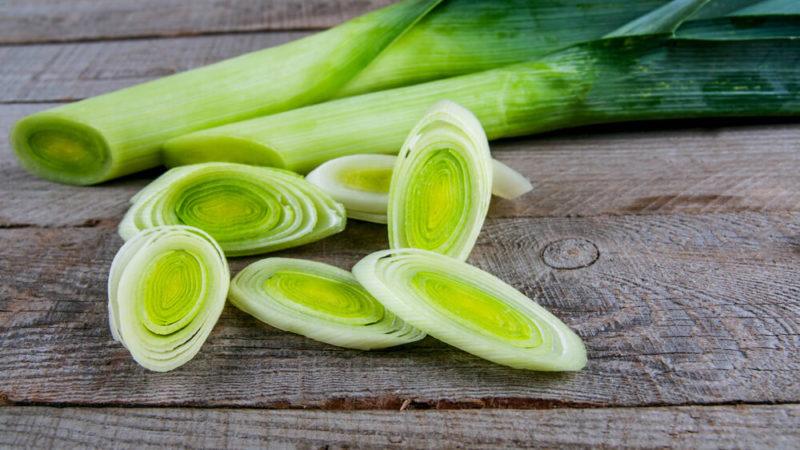The softy of the onion family, you will find fresh leeks in every chef’s walk-in fridge; they form an integral part of the classic “Mirepoix”, a combination of chopped carrots, celery, leeks and onions used to add flavour and aroma to stocks, sauces, soups and other foods.
I am particularly fond of leeks. As I young chef in the eighties, I remember eating at Marco Pierre White’s Harvey’s restaurant and trying his Pressed terrine of leeks with langoustines and thinking that it was just awesome. This beautiful terrine was the perfect marriage of sea and earth, simply made with only boiled leeks and cooked & shelled langoustines pressed into a terrine mould. When sliced, the layers created a stunning green, white and red mosaic. It was then garnished with a generous spoonful of caviar. That fantastic dish will live in my memory forever.
Like garlic and onion, leeks are a member of the allium family, but have their own distinct flavour. When cut they have a beautiful variation in colour. They go from white down by the root, to a yellow center, to a really dark green at the top. Cut the leek just below the really dark green part. Those really dark, green leaves are very tough and should be saved for the stockpot or soups.
Leeks are very versatile and work well cooked in various recipes or as a side dish. I love chilled leeks with a simple vinaigrette or served hot with hollandaise sauce. They marry well with tomatoes, peas, bacon & potatoes. Serve them with cheese sauce and grilled salmon or try this delicious Spanish style monkish with saffron, mussels and leeks.
Monkfish tails with mussels, saffron and leeks
Ingredients
Serves 4
· 4 monkfish tails, 220g each
· 400g mussels, cleaned & de-bearded
· 4 tbsp olive oil
· 1 onion, finely chopped
· 4 cloves garlic, finely chopped
· 2 leeks, cleaned and chopped
· ½ tsp saffron
· ½ tsp paprika
· 250g tomatoes, peeled, deseeded and chopped
· 350ml dry white wine
· 300ml fish stock
· 2 tbsp finely chopped chives
· Seasoning

Method
Heat the olive oil in a heavy bottomed saucepan and seal the monkfish tails on both sides for 1-2 minutes. Remove the monkfish and set aside. Add the chopped onion, leeks, saffron, paprika and garlic to the saucepan. Cook over gentle flame for 2-3 minutes until the onions and leeks start to soften. Add the tomatoes, white wine and fish stock.
Cook over a gentle flame for 15-20 minutes until the sauce thickens. Add the mussels and reserved monkfish fillets. Cover with a lid and cook for a further 5 minutes until all the mussels have opened. Season to taste, sprinkle with chopped chives and serve immediately.
Vichyssoise
This is a classic French soup that can be served hot but is traditionally served chilled.
Ingredients
· 250g sliced leeks (white part only)
· 250g peeled and quartered potatoes
· 30g butter
· 1.5l light chicken stock
· 300ml cream
· Bunch of chives (chopped)
· Seasoning

Gently sweat the leeks and potatoes in the butter then add the chicken stock and bring to the boil. Simmer for 15 minutes. Puree in a food processor and pass through a fine sieve. Add the cream and season to taste. Chill in the refrigerator.
Finally, stir in the chopped chives and serve.
Flamiche
Flamiche is the Flemish word for cake. This dish comes from northern France where Belgium meets Northern France. A flamiche is similar to a quiche but originally used bread dough instead of pastry. Now, it refers to a pie crust filled with a custard containing leeks & cheese. A flamiche can be made without a top crust, like a pizza.
Ingredients
· Short crust pastry
· 300 g flour
· 150 g butter, chilled & diced
· A pinch of salt
· 2tbsp water

Sift the flour and tip it into a food processor or bowl. Add the butter & salt. Whizz to form breadcrumbs. Don’t over-process it. Pace the dough on a floured surface and add 2 tbsp cold water. Start to bring the pastry together (you want to have as little contact with the pastry yourself as possible to stop it getting too hot). Wrap in clingfilm and chill for 30 minutes.
Ingredients
· 50 g flour
· 50 g butter
· 1 kg leeks, cleaned & chopped
· 1/2 litre milk
· 30g grated cheese
· Salt & pepper
· 1 pinch nutmeg
· 1 egg
Roll out the pastry on a lightly floured surface to about 3mm thick. Line a 20cm tart ring with the pastry and rest in the refrigerator for at least 20 minutes.
Sweat the leeks with the butter over low heat. They should become translucent.
Add the flour to the leeks and mix over low heat. Add the warm milk and cook for 3 or 4 minutes until thick. Season and add the nutmeg. Stir in the grated cheese and leave to cool. When cool, pour into the tart ring. Roll out the remaining pastry and cover the leeks with it. Seal with your finger and trim with a rolling pin, rolling it on the edge of the tart ring.
Prick the surface with a fork and glaze with egg wash. Bake for 30 minutes, at 200°C or 392°F at first, and lower the temperature down to 180°C or 356°F after 15 minutes. Serve warm.





No comments
To be able to write a comment, you have to be registered and logged in
Currently there are no comments.